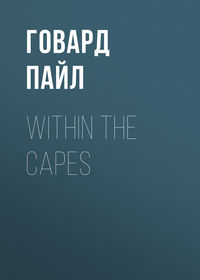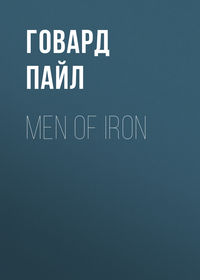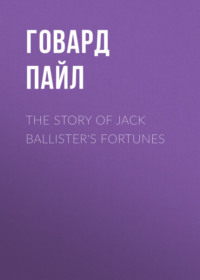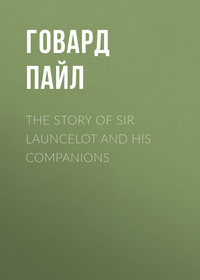 полная версия
полная версияOtto of the Silver Hand
Eight leagues had he ridden that day with neither a stop nor a stay; but now at last the end of his journey had come, and he drew rein under the shade of the great wooden gateway of St. Michaelsburg.
He reached up to the knotted rope and gave it a pull, and from within sounded the answering ring of the porter’s bell. By and by a little wicket opened in the great wooden portals, and the gentle, wrinkled face of old Brother Benedict, the porter, peeped out at the strange iron-clad visitor and the great black war-horse, streaked and wet with the sweat of the journey, flecked and dappled with flakes of foam. A few words passed between them, and then the little window was closed again; and within, the shuffling pat of the sandalled feet sounded fainter and fainter, as Brother Benedict bore the message from Baron Conrad to Abbot Otto, and the mail-clad figure was left alone, sitting there as silent as a statue.
By and by the footsteps sounded again; there came a noise of clattering chains and the rattle of the key in the lock, and the rasping of the bolts dragged back. Then the gate swung slowly open, and Baron Conrad rode into the shelter of the White Cross, and as the hoofs of his war-horse clashed upon the stones of the courtyard within, the wooden gate swung slowly to behind him.
Abbot Otto stood by the table when Baron Conrad entered the high-vaulted room from the farther end. The light from the oriel window behind the old man shed broken rays of light upon him, and seemed to frame his thin gray hairs with a golden glory. His white, delicate hand rested upon the table beside him, and upon some sheets of parchment covered with rows of ancient Greek writing which he had been engaged in deciphering.
Clank! clank! clank! Baron Conrad strode across the stone floor, and then stopped short in front of the good old man.
“What dost thou seek here, my son?” said the Abbot.
“I seek sanctuary for my son and thy brother’s grandson,” said the Baron Conrad, and he flung back the folds of his cloak and showed the face of the sleeping babe.
For a while the Abbot said nothing, but stood gazing dreamily at the baby. After a while he looked up. “And the child’s mother,” said he – “what hath she to say at this?”
“She hath naught to say,” said Baron Conrad, hoarsely, and then stopped short in his speech. “She is dead,” said he, at last, in a husky voice, “and is with God’s angels in paradise.”
The Abbot looked intently in the Baron’s face. “So!” said he, under his breath, and then for the first time noticed how white and drawn was the Baron’s face. “Art sick thyself?” he asked.
“Ay,” said the Baron, “I have come from death’s door. But that is no matter. Wilt thou take this little babe into sanctuary? My house is a vile, rough place, and not fit for such as he, and his mother with the blessed saints in heaven.” And once more Conrad of Drachenhausen’s face began twitching with the pain of his thoughts.
“Yes,” said the old man, gently, “he shall live here,” and he stretched out his hands and took the babe. “Would,” said he, “that all the little children in these dark times might be thus brought to the house of God, and there learn mercy and peace, instead of rapine and war.”
For a while he stood looking down in silence at the baby in his arms, but with his mind far away upon other things. At last he roused himself with a start. “And thou,” said he to the Baron Conrad – “hath not thy heart been chastened and softened by this? Surely thou wilt not go back to thy old life of rapine and extortion?”
“Nay,” said Baron Conrad, gruffly, “I will rob the city swine no longer, for that was the last thing that my dear one asked of me.”
The old Abbot’s face lit up with a smile. “I am right glad that thy heart was softened, and that thou art willing at last to cease from war and violence.”
“Nay,” cried the Baron, roughly, “I said nothing of ceasing from war. By heaven, no! I will have revenge!” And he clashed his iron foot upon the floor and clinched his fists and ground his teeth together. “Listen,” said he, “and I will tell thee how my troubles happened. A fortnight ago I rode out upon an expedition against a caravan of fat burghers in the valley of Gruenhoffen. They outnumbered us many to one, but city swine such as they are not of the stuff to stand against our kind for a long time. Nevertheless, while the men-at-arms who guarded the caravan were staying us with pike and cross-bow from behind a tree which they had felled in front of a high bridge the others had driven the pack-horses off, so that by the time we had forced the bridge they were a league or more away. We pushed after them as hard as we were able, but when we came up with them we found that they had been joined by Baron Frederick of Trutz-Drachen, to whom for three years and more the burghers of Gruenstadt have been paying a tribute for his protection against others. Then again they made a stand, and this time the Baron Frederick himself was with them. But though the dogs fought well, we were forcing them back, and might have got the better of them, had not my horse stumbled upon a sloping stone, and so fell and rolled over upon me. While I lay there with my horse upon me, Baron Frederick ran me down with his lance, and gave me that foul wound that came so near to slaying me – and did slay my dear wife. Nevertheless, my men were able to bring me out from that press and away, and we had bitten the Trutz-Drachen dogs so deep that they were too sore to follow us, and so let us go our way in peace. But when those fools of mine brought me to my castle they bore me lying upon a litter to my wife’s chamber. There she beheld me, and, thinking me dead, swooned a death-swoon, so that she only lived long enough to bless her new-born babe and name it Otto, for you, her father’s brother. But, by heavens! I will have revenge, root and branch, upon that vile tribe, the Roderburgs of Trutz-Drachen. Their great-grandsire built that castle in scorn of Baron Casper in the old days; their grandsire slew my father’s grandsire; Baron Nicholas slew two of our kindred; and now this Baron Frederick gives me that foul wound and kills my dear wife through my body.” Here the Baron stopped short; then of a sudden, shaking his fist above his head, he cried out in his hoarse voice: “I swear by all the saints in heaven, either the red cock shall crow over the roof of Trutz-Drachen or else it shall crow over my house! The black dog shall sit on Baron Frederick’s shoulders or else he shall sit on mine!” Again he stopped, and fixing his blazing eyes upon the old man, “Hearest thou that, priest?” said he, and broke into a great boisterous laugh.
Abbot Otto sighed heavily, but he tried no further to persuade the other into different thoughts.
“Thou art wounded,” said he, at last, in a gentle voice; “at least stay here with us until thou art healed.”
“Nay,” said the Baron, roughly, “I will tarry no longer than to hear thee promise to care for my child.”
“I promise,” said the Abbot; “but lay aside thy armor, and rest.”
“Nay,” said the Baron, “I go back again to-day.”
At this the Abbot cried out in amazement: “Sure thou, wounded man, would not take that long journey without a due stay for resting! Think! Night will be upon thee before thou canst reach home again, and the forests are beset with wolves.”
The Baron laughed. “Those are not the wolves I fear,” said he. “Urge me no further, I must return to-night; yet if thou hast a mind to do me a kindness thou canst give me some food to eat and a flask of your golden Michaelsburg; beyond these, I ask no further favor of any man, be he priest or layman.”
“What comfort I can give thee thou shalt have,” said the Abbot, in his patient voice, and so left the room to give the needful orders, bearing the babe with him.
V. How Otto Dwelt at St. Michaelsburg
So the poor, little, motherless waif lived among the old monks at the White Cross on the hill, thriving and growing apace until he had reached eleven or twelve years of age; a slender, fair-haired little fellow, with a strange, quiet serious manner.
“Poor little child!” Old Brother Benedict would sometimes say to the others, “poor little child! The troubles in which he was born must have broken his wits like a glass cup. What think ye he said to me to-day? ‘Dear Brother Benedict,’ said he, ‘dost thou shave the hair off of the top of thy head so that the dear God may see thy thoughts the better?’ Think of that now!” and the good old man shook with silent laughter.
When such talk came to the good Father Abbot’s ears, he smiled quietly to himself. “It may be,” said he, “that the wisdom of little children flies higher than our heavy wits can follow.”
At least Otto was not slow with his studies, and Brother Emmanuel, who taught him his lessons, said more than once that, if his wits were cracked in other ways, they were sound enough in Latin.
Otto, in a quaint, simple way which belonged to him, was gentle and obedient to all. But there was one among the Brethren of St. Michaelsburg whom he loved far above all the rest – Brother John, a poor half-witted fellow, of some twenty-five or thirty years of age. When a very little child, he had fallen from his nurse’s arms and hurt his head, and as he grew up into boyhood, and showed that his wits had been addled by his fall, his family knew not what else to do with him, and so sent him off to the Monastery of St. Michaelsburg, where he lived his simple, witless life upon a sort of sufferance, as though he were a tame, harmless animal.
While Otto was still a little baby, he had been given into Brother John’s care. Thereafter, and until Otto had grown old enough to care for himself, poor Brother John never left his little charge, night or day. Oftentimes the good Father Abbot, coming into the garden, where he loved to walk alone in his meditations, would find the poor, simple Brother sitting under the shade of the pear-tree, close to the bee-hives, rocking the little baby in his arms, singing strange, crazy songs to it, and gazing far away into the blue, empty sky with his curious, pale eyes.
Although, as Otto grew up into boyhood, his lessons and his tasks separated him from Brother John, the bond between them seemed to grow stronger rather than weaker. During the hours that Otto had for his own they were scarcely ever apart. Down in the vineyard, where the monks were gathering the grapes for the vintage, in the garden, or in the fields, the two were always seen together, either wandering hand in hand, or seated in some shady nook or corner.
But most of all they loved to lie up in the airy wooden belfry; the great gaping bell hanging darkly above them, the mouldering cross-beams glimmering far up under the dim shadows of the roof, where dwelt a great brown owl that, unfrightened at their familiar presence, stared down at them with his round, solemn eyes. Below them stretched the white walls of the garden, beyond them the vineyard, and beyond that again the far shining river, that seemed to Otto’s mind to lead into wonder-land. There the two would lie upon the belfry floor by the hour, talking together of the strangest things.
“I saw the dear Angel Gabriel again yester morn,” said Brother John.
“So!” says Otto, seriously; “and where was that?”
“It was out in the garden, in the old apple-tree,” said Brother John. “I was walking there, and my wits were running around in the grass like a mouse. What heard I but a wonderful sound of singing, and it was like the hum of a great bee, only sweeter than honey. So I looked up into the tree, and there I saw two sparks. I thought at first that they were two stars that had fallen out of heaven; but what think you they were, little child?”
“I do not know,” said Otto, breathlessly.
“They were angel’s eyes,” said Brother John; and he smiled in the strangest way, as he gazed up into the blue sky. “So I looked at the two sparks and felt happy, as one does in spring time when the cold weather is gone, and the warm sun shines, and the cuckoo sings again. Then, by-and-by, I saw the face to which the eyes belonged. First, it shone white and thin like the moon in the daylight; but it grew brighter and brighter, until it hurt one’s eyes to look at it, as though it had been the blessed sun itself. Angel Gabriel’s hand was as white as silver, and in it he held a green bough with blossoms, like those that grow on the thorn bush. As for his robe, it was all of one piece, and finer than the Father Abbot’s linen, and shone beside like the sunlight on pure snow. So I knew from all these things that it was the blessed Angel Gabriel.”
“What do they say about this tree, Brother John?” said he to me.
“They say it is dying, my Lord Angel,” said I, “and that the gardener will bring a sharp axe and cut it down.”
“‘And what dost thou say about it, Brother John?’ said he.”
“‘I also say yes, and that it is dying,’ said I.”
“At that he smiled until his face shone so bright that I had to shut my eyes.”
“‘Now I begin to believe, Brother John, that thou art as foolish as men say,’ said he. ‘Look, till I show thee.’ And thereat I opened mine eyes again.”
“Then Angel Gabriel touched the dead branches with the flowery twig that he held in his hand, and there was the dead wood all covered with green leaves, and fair blossoms and beautiful apples as yellow as gold. Each smelling more sweetly than a garden of flowers, and better to the taste than white bread and honey.
“‘They are souls of the apples,’ said the good Angel,’ and they can never wither and die.’
“‘Then I’ll tell the gardener that he shall not cut the tree down,’ said I.”
“‘No, no,’ said the dear Gabriel, ‘that will never do, for if the tree is not cut down here on the earth, it can never be planted in paradise.’”
Here Brother John stopped short in his story, and began singing one of his crazy songs, as he gazed with his pale eyes far away into nothing at all.
“But tell me, Brother John,” said little Otto, in a hushed voice, “what else did the good Angel say to thee?”
Brother John stopped short in his song and began looking from right to left, and up and down, as though to gather his wits.
“So!” said he, “there was something else that he told me. Tschk! If I could but think now. Yes, good! This is it – ‘Nothing that has lived,’ said he, ‘shall ever die, and nothing that has died shall ever live.’”
Otto drew a deep breath. “I would that I might see the beautiful Angel Gabriel sometime,” said he; but Brother John was singing again and did not seem to hear what he said.
Next to Brother John, the nearest one to the little child was the good Abbot Otto, for though he had never seen wonderful things with the eyes of his soul, such as Brother John’s had beheld, and so could not tell of them, he was yet able to give little Otto another pleasure that no one else could give.
He was a great lover of books, the old Abbot, and had under lock and key wonderful and beautiful volumes, bound in hog-skin and metal, and with covers inlaid with carved ivory, or studded with precious stones. But within these covers, beautiful as they were, lay the real wonder of the books, like the soul in the body; for there, beside the black letters and initials, gay with red and blue and gold, were beautiful pictures painted upon the creamy parchment. Saints and Angels, the Blessed Virgin with the golden oriole about her head, good St. Joseph, the three Kings; the simple Shepherds kneeling in the fields, while Angels with glories about their brow called to the poor Peasants from the blue sky above. But, most beautiful of all was the picture of the Christ Child lying in the manger, with the mild-eyed Kine gazing at him.
Sometimes the old Abbot would unlock the iron-bound chest where these treasures lay hidden, and carefully and lovingly brushing the few grains of dust from them, would lay them upon the table beside the oriel window in front of his little namesake, allowing the little boy freedom to turn the leaves as he chose.
Always it was one picture that little Otto sought; the Christ Child in the manger, with the Virgin, St. Joseph, the Shepherds, and the Kine. And as he would hang breathlessly gazing and gazing upon it, the old Abbot would sit watching him with a faint, half-sad smile flickering around his thin lips and his pale, narrow face.
It was a pleasant, peaceful life, but by-and-by the end came. Otto was now nearly twelve years old.
One bright, clear day, near the hour of noon, little Otto heard the porter’s bell sounding below in the court-yard – dong! dong! Brother Emmanuel had been appointed as the boy’s instructor, and just then Otto was conning his lessons in the good monk’s cell. Nevertheless, at the sound of the bell he pricked up his ears and listened, for a visitor was a strange matter in that out-of-the-way place, and he wondered who it could be. So, while his wits wandered his lessons lagged.
“Postera Phoeba lustrabat lampade terras,” continued Brother Emmanuel, inexorably running his horny finger-nail beneath the line, “humentemque Aurora polo dimoverat umbram – ” the lesson dragged along.
Just then a sandaled footstep sounded without, in the stone corridor, and a light tap fell upon Brother Emmanuel’s door. It was Brother Ignatius, and the Abbot wished little Otto to come to the refectory.
As they crossed the court-yard Otto stared to see a group of mail-clad men-at-arms, some sitting upon their horses, some standing by the saddle-bow. “Yonder is the young baron,” he heard one of them say in a gruff voice, and thereupon all turned and stared at him.
A stranger was in the refectory, standing beside the good old Abbot, while food and wine were being brought and set upon the table for his refreshment; a great, tall, broad-shouldered man, beside whom the Abbot looked thinner and slighter than ever.
The stranger was clad all in polished and gleaming armor, of plate and chain, over which was drawn a loose robe of gray woollen stuff, reaching to the knees and bound about the waist by a broad leathern sword-belt. Upon his arm he carried a great helmet which he had just removed from his head. His face was weather-beaten and rugged, and on lip and chin was a wiry, bristling beard; once red, now frosted with white.
Brother Ignatius had bidden Otto to enter, and had then closed the door behind him; and now, as the lad walked slowly up the long room, he gazed with round, wondering blue eyes at the stranger.
“Dost know who I am, Otto? said the mail-clad knight, in a deep, growling voice.
“Methinks you are my father, sir,” said Otto.
“Aye, thou art right,” said Baron Conrad, “and I am glad to see that these milk-churning monks have not allowed thee to forget me, and who thou art thyself.”
“An’ it please you,” said Otto, “no one churneth milk here but Brother Fritz; we be makers of wine and not makers of butter, at St. Michaelsburg.”
Baron Conrad broke into a great, loud laugh, but Abbot Otto’s sad and thoughtful face lit up with no shadow of an answering smile.
“Conrad,” said he, turning to the other, “again let me urge thee; do not take the child hence, his life can never be your life, for he is not fitted for it. I had thought,” said he, after a moment’s pause, “I had thought that thou hadst meant to consecrate him – this motherless one – to the care of the Universal Mother Church.”
“So!” said the Baron, “thou hadst thought that, hadst thou? Thou hadst thought that I had intended to deliver over this boy, the last of the Vuelphs, to the arms of the Church? What then was to become of our name and the glory of our race if it was to end with him in a monastery? No, Drachenhausen is the home of the Vuelphs, and there the last of the race shall live as his sires have lived before him, holding to his rights by the power and the might of his right hand.”
The Abbot turned and looked at the boy, who was gaping in simple wide-eyed wonderment from one to the other as they spoke.
“And dost thou think, Conrad,” said the old man, in his gentle, patient voice, “that that poor child can maintain his rights by the strength of his right hand?”
The Baron’s look followed the Abbot’s, and he said nothing.
In the few seconds of silence that followed, little Otto, in his simple mind, was wondering what all this talk portended. Why had his father come hither to St. Michaelsburg, lighting up the dim silence of the monastery with the flash and ring of his polished armor? Why had he talked about churning butter but now, when all the world knew that the monks of St. Michaelsburg made wine.
It was Baron Conrad’s deep voice that broke the little pause of silence.
“If you have made a milkmaid of the boy,” he burst out at last, “I thank the dear heaven that there is yet time to undo your work and to make a man of him.”
The Abbot sighed. “The child is yours, Conrad,” said he, “the will of the blessed saints be done. Mayhap if he goes to dwell at Drachenhausen he may make you the better instead of you making him the worse.”
Then light came to the darkness of little Otto’s wonderment; he saw what all this talk meant and why his father had come hither. He was to leave the happy, sunny silence of the dear White Cross, and to go out into that great world that he had so often looked down upon from the high windy belfry on the steep hillside.
VI. How Otto Lived in the Dragon’s House
The gates of the Monastery stood wide open, the world lay beyond, and all was ready for departure. Baron Conrad and his men-at-arms sat foot in stirrup, the milk-white horse that had been brought for Otto stood waiting for him beside his father’s great charger.
“Farewell, Otto,” said the good old Abbot, as he stooped and kissed the boy’s cheek.
“Farewell,” answered Otto, in his simple, quiet way, and it brought a pang to the old man’s heart that the child should seem to grieve so little at the leave-taking.
“Farewell, Otto,” said the brethren that stood about, “farewell, farewell.”
Then poor brother John came forward and took the boy’s hand, and looked up into his face as he sat upon his horse. “We will meet again,” said he, with his strange, vacant smile, “but maybe it will be in Paradise, and there perhaps they will let us lie in the father’s belfry, and look down upon the angels in the court-yard below.”
“Aye,” answered Otto, with an answering smile.
“Forward,” cried the Baron, in a deep voice, and with a clash of hoofs and jingle of armor they were gone, and the great wooden gates were shut to behind them.
Down the steep winding pathway they rode, and out into the great wide world beyond, upon which Otto and brother John had gazed so often from the wooden belfry of the White Cross on the hill.
“Hast been taught to ride a horse by the priests up yonder on Michaelsburg?” asked the Baron, when they had reached the level road.
“Nay,” said Otto; “we had no horse to ride, but only to bring in the harvest or the grapes from the further vineyards to the vintage.”
“Prut,” said the Baron, “methought the abbot would have had enough of the blood of old days in his veins to have taught thee what is fitting for a knight to know; art not afeared?”
“Nay,” said Otto, with a smile, “I am not afeared.”
“There at least thou showest thyself a Vuelph,” said the grim Baron. But perhaps Otto’s thought of fear and Baron Conrad’s thought of fear were two very different matters.
The afternoon had passed by the time they had reached the end of their journey. Up the steep, stony path they rode to the drawbridge and the great gaping gateway of Drachenhausen, where wall and tower and battlement looked darker and more forbidding than ever in the gray twilight of the coming night. Little Otto looked up with great, wondering, awe-struck eyes at this grim new home of his.
The next moment they clattered over the drawbridge that spanned the narrow black gulph between the roadway and the wall, and the next were past the echoing arch of the great gateway and in the gray gloaming of the paved court-yard within.
Otto looked around upon the many faces gathered there to catch the first sight of the little baron; hard, rugged faces, seamed and weather-beaten; very different from those of the gentle brethren among whom he had lived, and it seemed strange to him that there was none there whom he should know.
As he climbed the steep, stony steps to the door of the Baron’s house, old Ursela came running down to meet him. She flung her withered arms around him and hugged him close to her. “My little child,” she cried, and then fell to sobbing as though her heart would break.











